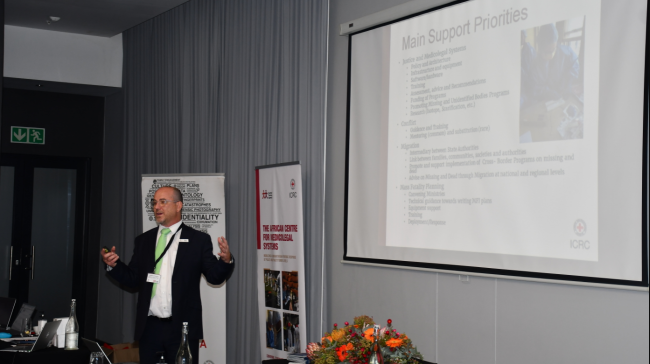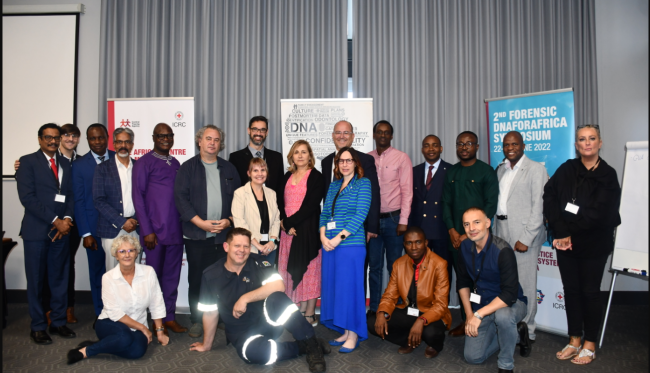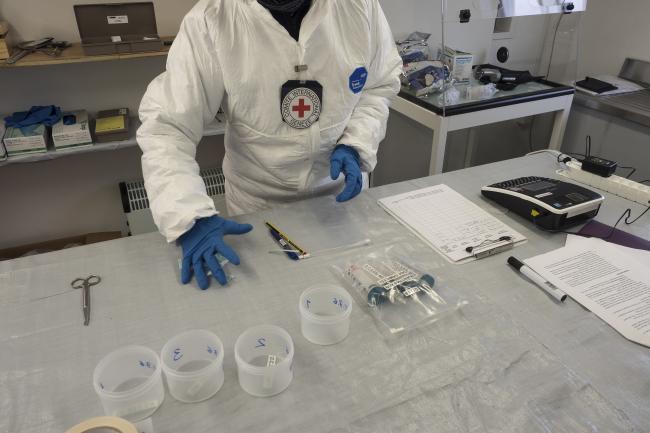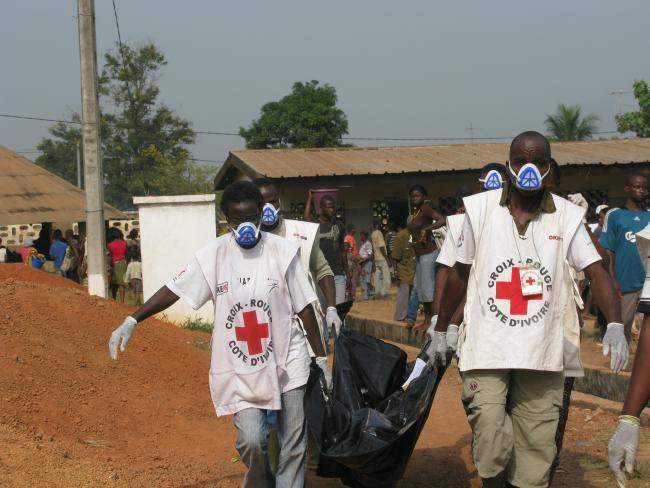Un mecanismo para fortalecer las capacidades forenses y medicolegales en África
El Centro Africano de Sistemas Medicolegales (ACMS, por sus siglas en inglés) se inauguró oficialmente el 8 de noviembre de 2022 en Pretoria, Sudáfrica. Su apertura representa un gran paso para el fortalecimiento de las capacidades forenses y medicolegales en África.
El ACMS es una red que conecta a responsables de la formulación de políticas y a especialistas en materia de ciencias forenses y medicolegales para promover conocimientos y recursos especializados en el tema dentro de la región y en todo el mundo. El propósito del ACMS es brindar información a los responsables de la formulación de políticas, mejorar la respuesta de los profesionales de los sistemas medicolegales y propiciar el intercambio de prácticas y aprendizajes mediante la organización de eventos regionales y la coordinación y colaboración con comunidades de práctica y de elaboración de políticas en el continente y a nivel internacional.

MISIÓN
La misión del Centro Africano de Sistemas Medicolegales de la Cruz Roja y la Media Luna Roja es dar apoyo a la región atendiendo las necesidades de las poblaciones afectadas por conflictos armados, desastres naturales y la migración, y mejorar los programas multidisciplinarios de asistencia pública a través de las prácticas y los principios forenses humanitarios aplicados por las comunidades judiciales y medicolegales. Consideramos que, al trabajar juntos, podemos mejorar los sistemas medicolegales en toda África y dar asistencia a las familias afectadas por la pérdida de seres queridos. Mediante la colaboración y la coordinación de esfuerzos entre organizaciones internacionales, el ACMS permite que se adopten prácticas y principios humanitarios en todos los niveles de los sistemas judiciales y medicolegales para dar respuesta a los casos de todas las víctimas, en todo tipo de circunstancias.
African Centre for Medicolegal Systems Library

Proyecto de Identificación del Personal Militar
El Proyecto de Identificación del Personal Militar del CICR es una iniciativa de múltiples fases con una duración de tres años, lanzada en 2024 por el Centro Africano de Sistemas Medicolegales del CICR y el Centro de Personas Desaparecidas de la Cruz Roja y la Media Luna Roja.
ACTIVIDADES
En junio de 2022, el ACMS comenzó extraoficialmente su labor de influencia en la región trabajando junto con DNAforAfrica en la organización de un simposio en Nairobi, Kenia. Esta colaboración puso de relieve la importancia de que el CICR trabaje junto con otras organizaciones e instituciones de la región para llegar a un público especializado más amplio en África mediante sus iniciativas de sensibilización y de capacitación sobre actividades forenses humanitarias.

EL CONSORCIO INTERNACIONAL DE ORGANIZACIONES
En noviembre de 2022, inmediatamente después del lanzamiento oficial, el ACMS organizó el primer Consorcio de Organizaciones Internacionales, un encuentro de dos días enfocado en promover el desarrollo de capacidades medicolegales y de justicia. El evento contó con la participación de representantes de diversas organizaciones regionales e internacionales, como la Unidad Forense del CICR, la Oficina de las Naciones Unidas contra la Droga y el Delito, la Comisión de la Unión Africana e Interpol, que debatieron sobre posibles oportunidades de colaboración interorganizacional en el ámbito del desarrollo de capacidades forenses y medicolegales en África. Como resultado, los representantes de las diversas organizaciones presentes se comprometieron a mejorar la colaboración y coordinación de sus iniciativas de desarrollo de capacidades medicolegales y de justicia en África.
LA ACADEMIA AFRICANA DE CIENCIAS FORENSES
Por otra parte, en diciembre de 2022, el ACMS convocó a un grupo de trabajo para planificar la apertura de una Academia Africana de Ciencias Forenses. El objetivo es fundar una asociación profesional sostenible de especialistas en ciencias forenses que tendrá como finalidad estandarizar las prácticas forenses en África, dar credibilidad y visibilidad a la comunidad forense ya establecida de la región, promover conocimientos en el plano regional y mejorar las normas, la certificación, la regulación y la acreditación de profesionales de todas las disciplinas forenses. Esta institución será la primera de su clase en el continente y brindará una plataforma única para el intercambio de conocimientos y experiencias relativas a las ciencias forenses. El anuncio oficial sobre la academia se realizará en el Congreso de la Asociación Africana de Medicina Forense, que se realizará en marzo de 2023 en Kigali, Ruanda.
Capacitación: Exámenes Forenses de Identificación Humana en Morgues
El Examen Forense de Identificación Humana en Morgues es una herramienta de capacitación creada para demostrar por qué es necesario realizar un examen exhaustivo de los cuerpos no identificados.
Las actividades incluyen observación, documentación, fotografía, toma de huellas dactilares, exámenes dentales, radiografías y recolección de muestras. El objetivo es garantizar que la identificación sea posible en el futuro mediante un enfoque multidisciplinario, independientemente del estado o condición del cuerpo. Todos los restos humanos no identificados deben someterse a un examen antes de su entierro provisional o definitivo.
La herramienta de capacitación también aborda la importancia de mostrar dignidad y respeto durante el proceso de examen, resalta la necesidad de involucrar a las familias de las personas desaparecidas para obtener la información personal necesaria para la identificación y enfatiza la responsabilidad de las autoridades en la protección de los datos y las muestras.
Esta herramienta ha sido diseñada para informar a los profesionales de primera y segunda respuesta sobre la importancia de seguir un enfoque sistemático. También está dirigida a estudiantes de facultades de derecho, salud, ciencias forenses, policía y gestión de desastres; academias de policía, defensa civil y fuerzas armadas; así como al personal y voluntarios de organizaciones de la sociedad civil que participan en la recuperación y gestión de los fallecidos y necesitan comprender el papel y las funciones del sistema medicolegal. Este sistema se beneficia de esfuerzos profesionales en la recuperación y gestión de escenas de muerte, pero se ve gravemente afectado por malas prácticas.
El video de capacitación consta de 14 capítulos, que pueden mostrarse de forma individual para adaptarse a los programas de formación, la instrucción temática y las discusiones.
ADVERTENCIA: CONTENIDO GRÁFICO
La herramienta de capacitación muestra actividades de identificación forense de carácter gráfico, que pueden no ser adecuadas para todos los espectadores. Los procedimientos forenses mostrados se llevaron a cabo en cadáveres; esto es necesario para demostrar el enfoque multidisciplinario de la identificación forense a otros profesionales forenses.
Centro Africano de Sistemas Medicolegales en los medios

OPERACIONES DE LIMPIEZA POST-INUNDACIÓN: PROCESO DE IDENTIFICACIÓN DE SERES QUERIDOS (NEWZROOM AFRIKA)
Las víctimas de las inundaciones de Cato Crest están pidiendo al Municipio de eThekwini que cumpla con su promesa respecto a los esfuerzos de reconstrucción. Funcionarios visitaron la zona para evaluar los daños días después de que siete personas perdieran la vida debido a las fuertes lluvias y las inundaciones posteriores. El Gerente Forense de la Cruz Roja, Stephen Fonseca, explica cómo las familias pueden comenzar a identificar a sus seres queridos.

Podcast: Channel Africa
Podcast: Channel Africa. El Gerente Forense Stephen Fonseca habla sobre el perfilado de ADN
Stephen Fonseca, Gerente Regional Forense de África para el Comité Internacional de la Cruz Roja, se une al programa On The Move en el estudio para hablar sobre el perfilado de ADN y la medicina forense en el contexto de los esfuerzos humanitarios.

Podcast: The Talking Point
Identificación de cuerpos no identificados
Invitado (Estudio): Stephen Fonseca – Gerente del Centro Africano de Sistemas Medicolegales del CICR en el sur de África – Es una red de profesionales forenses a lo largo del continente africano.
El Departamento de Salud de Gauteng ha instado a las personas con familiares desaparecidos a presentarse, ya que más de 900 cuerpos no identificados se encuentran en las morgues de la provincia. Los servicios de patología forense (FPS) del departamento en Gauteng tienen 938 cuerpos no reclamados y no identificados en sus 11 morgues. Decidimos aprovechar esta oportunidad para educarnos sobre estos procesos y también para aquellos nacionales extranjeros que fallecen en el país, sobre cómo sus familias pueden reclamarlos. Uno de los casos que ha dominado las noticias es cómo la Dra. Nadipha presuntamente robó tres cuerpos, así como la suposición de que el cuerpo que se quemó en la celda de la prisión era el de Thabo Bester. La gran pregunta es: ¿cómo puede suceder algo así y cuál es el papel de la medicina forense en todo esto?

